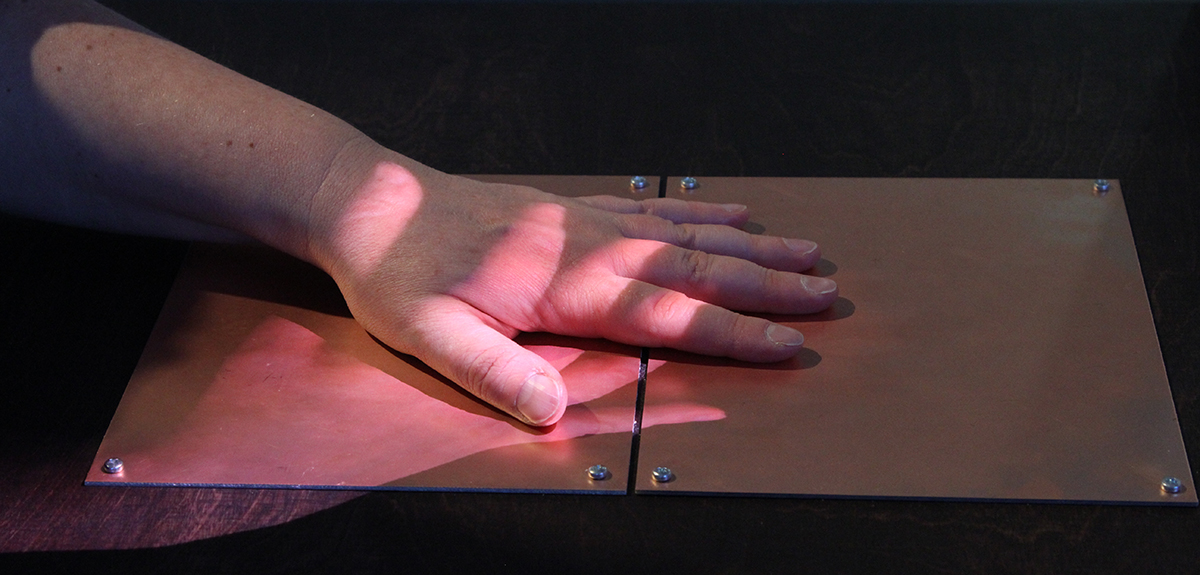
Image: Heidi Tikka: GSR 2 2014. Interactive video projection, galvanic skin reaction interface. Digital files, custom software, gsr-interface, table. Copyright: Heidi Tikka
Organized by the Nordic Network Gender Body Health,
in collaboration with Helsinki Collegium for Advanced Studies
Funded by the Joint Committee for Nordic Research Councils in the Humanities and Social Sciences (NOS-HS) and The Division for Gender Studies, Stockholm University
Keynote speakers: Professor Deborah Lupton (University of Canberra, Australia), Professor Celia Roberts (Lancaster University, UK), and visual artist Heidi Tikka (Helsinki, Finland)
The twenty-first century has been marked by an increasing number of (bio)technologies that enable intimate and continuous monitoring of bodies in the name of health and well-being. Self-tracking and self-monitoring technologies have emerged across the domains of well-being, preventive medicine and identity work. These technologies can involve self-tracking of daily activities or exercise, monitoring personal goals such as weight loss or conception, identifying and managing existing or potential medical conditions, and tracing identity, for example, through genetic ancestry. Yet, these monitoring developments encompass forms of self-tracking which go beyond ‘do-it-yourself’ kits or personalized devices. We have also seen trends towards ‘molecular’ monitoring of the body and enhanced forms of biomedical self-governance (Rose, 2007). These new technologies, marketed to both patients and health practitioners as consumers, are part of a larger process of commodification of not only health technologies but also health itself (Clarke et al., 2010). New health technologies can enable the crossing of scientific/non-scientific boundaries, and creative or unanticipated uses of such technologies may emerge. These changes may demand a more active and purposive role of individuals in their own health and well-being. Our workshop seeks to explore critically how this increasingly biotechnological landscape is transforming how bodies, identity and health are read, measured, experienced and practiced.
Self-tracking and self-monitoring technologies have been approached from a range of perspectives. Yet relatively little attention has been paid to what role gender, race, disability, class and migration may play. The conference sets out to explore the role of concepts such as self, body and risk in formations of gendered and racialized identity and self-governance. We ask how gender, race, disability, and/or class shape heterogeneous engagement with and experiences of self-tracking and self-monitoring technologies. We investigate how these technologies are situated in the larger dynamics of societal change, such as changes in the gendered and racialized responsibilities for care, or the neoliberal restructuring of societies. We ask how self-tracking technologies articulate or emerge through global and postcolonial power hierarchies, and in what global and local contexts they make sense as ways of managing health, well-being or identity. The workshop will creatively explore our (collective) responses to these increasingly individualizing, neoliberal technologies of the self in contemporary health practices and imaginaries.
Organizers
Dr Venla Oikkonen, Helsinki Collegium for Advanced Studies (venla.oikkonen@helsinki.fi)
Dr Ingrid Young, University of Edinburgh (ingrid.young@ed.ac.uk)
On behalf of the Nordic Network Gender Body Health
Contact
monitoringtheself@gmail.com